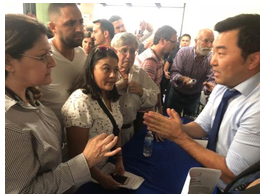CommentsRANTZ & RAVEZ-Los Angeles voters have answered the call from politicians and voted for additional taxes and fees to address the homeless crisis throughout the city.
Like always, they talk and talk and meet and vote and promise that things will improve in time if only the people will vote for these additional taxes and fees. Just give them more money and they’ll make it all better. But is it?
I have reviewed current public discussions and followed community meetings around the city that address the establishment of temporary homeless shelters in and around populated neighborhoods. I have heard many of the same comments from residents and business owners alike: “Not in my backyard or street or neighborhood.” From Koreatown to the San Fernando Valley to the West Los Angeles area and down the 110 freeway to San Pedro, the same sentiments are being expressed loud and clear by angry residents and frustrated business owners. Long-term residents are not supporting the building of temporary or permanent homeless shelters in their neighborhoods.
The homeless situation is not improving despite the millions of dollars that have been directed to rectify the matter. Placing shelters here and there as proposed by the Mayor will not do the job it is intended to do. While he travels around the country doing what many say is testing the waters for a presidential run, the situation continues to grow worse.
A recent proposed temporary homeless shelter in Koreatown drew an angry response from the community. The original plan was pulled back to calm their hostility. The local councilman learned that he must work with his constituents and not force any type of homeless shelter on a community, especially one that is well-organized and ready to protect the residents and business owners.
 A recent discussion in the San Fernando Valley at a local community meeting drew loud chants from the audience to recall the councilman who proposed a shelter there.
A recent discussion in the San Fernando Valley at a local community meeting drew loud chants from the audience to recall the councilman who proposed a shelter there.
The mayor thought it would be appropriate for each of the 15 city council districts to find a suitable location to establish shelters to serve the homeless population. The problem is that the homeless population numbers are growing at an ever-increasing rate. A few temporary shelters will not solve the situation of people living on the streets in tents and using the public right of way as their toilets. Compassion is one thing that all of us should have for our fellow human beings and all living creatures. The problem is that along with compassion comes a need for respect for others along with common decency. There must be a balance between the homeless population and the surrounding residents who deserve to live in peace and tranquility.
We have found that additional taxes for all of us and additional fees on the building industry have not brought about a solution for homelessness. Along with taxes and fees must come leadership and cooperation. At this time, City Hall leadership is lacking and cooperation with residents and business owners has not been effectively established. The negative impact of homelessness on your community continues no matter how many increased tax dollars you pay to solve the situation.
When you travel around the city, you will find may residential units being built. Condos and apartments are sprouting up everywhere. Despite the transportation gridlock and water crisis in the Los Angeles region, developers are at work building hundreds of residential units. While few if any are affordable or built to house the homeless population, the developers are moving forward and continuing to turn Los Angeles into a more congested, densely populated city. This is something to think about when it comes to community planning and a ensuring us all a decent quality of life.

(Dennis P. Zine is a former and retired LAPD Supervisor, former and retired 12-year Los Angeles City Councilman and current General Manager at Bell Canyon in Ventura County.) Edited for CityWatch by Linda Abrams.
















